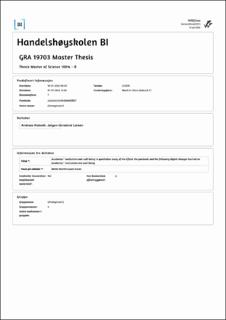| dc.description.abstract | The COVID-19 pandemic has led to drastic changes in the workday of academics and universities have experienced a radical shift towards becoming more digital. Restrictions have led universities to force their employees to work from home and implement digital tools as a part of their workday. This radical implementation of digital tools and remote work have been challenging, as many struggled to cope and adapt to the new situation. This perceived challenge seems to have increased the already high level of stress and demotivation among academics. Therefore, this study aims to investigate the effects the COVID-19 pandemic and the following digital changes have had on the motivation and well-being of academics in higher education. These effects will be investigated in the light of change theory, the Self-determination theory, and the Job Demands-Resource model. Additionally, we will also look
at how our findings are relevant for the future work of academics, and whether the “new normal” is the way of working going forward.
In this study we have conducted a qualitative study of eight academics from different universities in Norway. Our data was obtained through semi-structed in-depth interviews on Zoom. Further, this data was analyzed with the use of interpretative phenomenological analysis (IPA). The results of our analysis indicated that the pandemic and the following digital changes have had both positive and negative effects on academics’ motivation and well-being. Our findings suggest that the academics have experienced a loss in their main motivational factor, social relations, because of the pandemic. However, the findings also show that implementation of remote work and digital tools gave them more flexibility, which they found motivating. Further, there was a general agreement that they want to maintain some aspects of the pandemic and the following digital changes going forward. Based on these findings, implications are discussed. Additionally, limitations and suggestions for future research are also provided. | en_US |


